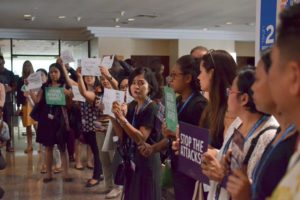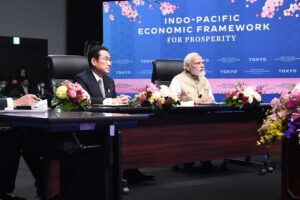IBON International Update #8 from Doha COP18
[[{“type”:”media”,”view_mode”:”media_large”,”fid”:”443″,”attributes”:{“alt”:””,”class”:”media-image”,”height”:”73″,”typeof”:”foaf:Image”,”width”:”309″}}]]
Climate, Number 8
Doha, December 6, 2012
As COP18 slowly draws to a close, much doubt remains as to whether agreement on immediate and meaningful measures to tackle climate change will be reached. This impression has been hardened by unconfirmed reports that UN Secretary General Ban Ki Moon said on Wednesday that he may convene a High-Level Forum on Climate Change in 2014. Such a forum could engage urgent issues at the highest political level, likely to be heads of state. While welcomed by major developed countries, this would take the momentum away from the COP process with ministers reluctant to make commitments in advance of 2014, and instead shift it to an arena in which developing countries are weaker as a negotiating bloc.
Quid pro quo
In the talks, two key areas, Long-term Cooperative Action, and the Durban Platform for Enhanced Action, have become interlinked as developed and developing countries engage in a quid pro quo over progress.
Talks on the Durban Platform, which centers on creating a new agreement to be formalized in 2015 before coming into action in 2020, were terminated by developing countries led by the G77/China. This move was in response to the intransigence of developed countries in making firm commitments to providing public finance in the mid-term, from 2013 to 2020, and over the long-term, beyond 2020, through the Green Climate Fund, and making meaningful mitigation commitments. Developing countries want developed nations to commit to funding equaling 1.5% of their annual GDP. The Philippines encapsulated the developing countries’ perception of the developed when it said they are “blockers and deniers who are refusing to show commitments and yet are pushing obligations onto developing countries”.
Developing countries will refuse to progress on Durban Platform (ADP) talks until they see satisfactory progress in LCA. They say that ADP talks are meaningless without first tackling issues such as finance and technology, among others. Thus, talks on long-term cooperative action (LCA) are central to COP18 ending with agreements or collapsing altogether.
However, the role of the US will be central to agreement in LCA—and the US has made its position clear that it will not, and it says cannot, commit to financing beyond the next year. US chief negotiator Jonathan Pershing reminded NGOs that the US would not subscribe to budgeting commitments it could not carry through at home, underlining that the ruling Democratic party does not control the US Congress. Of equal influence on the US is the power of the fossil fuel lobby. It has huge influence over Congress and the media, and lobbies legislators, funds climate deniers and exerts tremendous effort to halt a progressive shift in climate policy, thus having a consequent impact on progress at an international level.
Agreement nears in 2CP – lack of ambition remains
Agreement seems most likely to be reached in negotiations on a second commitment period (2CP) for the Kyoto Protocol, where Parties look likely to conclude on making 2CP legally binding. However, the extent of ambition in emissions reductions these agreements will show remains contested—while many developed countries have described commitments seen as lacking ambition as a “floor” level which they intend to go above, a developing-country retort has been that commitments are “underground”.
Australia has committed to a 5-percent reduction on 1990 levels, a level it has previously mentioned it would not raise without greater international commitments. It now joins 36 other countries in 2CP, including the EU, which is refusing to agree to emissions reductions above a 20 percent target, seen by developing countries as representing no real increase in ambition. However, it is thought that there are disagreements within the EU, which has to agree on its positions as a bloc. Poland is thought to be holding firm on a 20 percent target, citing its lower level of economic development and dependence on coal, with larger member states such as the UK, France and Germany, preferring a 30 percent target. Poland is hosting the COP 19 in Warsaw next November 2013.
Developing countries are arguing that the mitigation commitments of Annex I Parties (industrialized countries and economies in transition) must be established as targeted reductions (Quantified Emissions Limitation and Reduction Objectives – QELROs) through a multilaterally agreed methodology to ensure common accounting and comparability of efforts, thereby ensuring that Annex I Parties offer an equitable and adequate contribution. This is against the current state of play wherein countries are submitting individual pledges. Developing countries consider this arrangement to be political and that it represents an “empty shell”, and are arguing for aggregate reduction targets in line with historical responsibility.
Also of concern to developing countries and blocking progress is the insistence on the carry-over from the first commitment period of surplus allowances. Developing countries see this as a loophole that could result in no net contribution to further emissions reductions and thus in contradiction with ambition. The G77/China also believes countries not committing to 2CP should be restricted from Kyoto Protocol “flexibility mechanisms”—the three market mechanisms that together make up the carbon market. The bloc is also standing firm on its position that no new market mechanisms should be developed or concluded under LCA for Annex I Parties.
The view from civil society
Civil society organizations, including faith-based groups, indigenous peoples, NGOs, social movements, youth and farmers’ organisations attending the COP 18 have released an open letter to ministers and negotiators rejecting any “Doha deal” that locks in a decade of action which will adhere to a track resulting in global warming in excess of 1.5?C. They also point to the distraction of discussions around the ADP, for a treaty beginning in 2020, when action is needed immediately.
Among civil society demands are a rules-based system of pollution controls, comprising: an aggregate target and comparable effort from all developed countries, whether inside or outside the Kyoto Protocol; a ratifiable 2CP with at least 40–50 percent domestic emissions cuts by 2020; no access to market mechanisms without taking on a legal target, and no new market mechanisms; no carry-over of surplus emissions; and developing countries move away from “dirty” development pathways via the support of finance and technology from developed countries.
Civil society groups also demand the mobilization of resources from developed countries, including: the immediate establishment of an international mechanism on loss and damage; a commitment to adequate, scaled-up, new and additional public finance to match need; finance commitments in agreed text, not press conferences; rules to ensure the transparency of provision of adequate and additional finance; the immediate initiation of work on new sources of finance, including international financial transaction taxes; and an agreement to tackle the obstacle of intellectual property rights. ###



